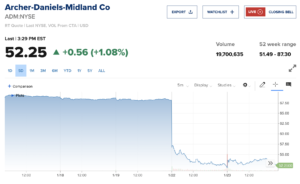As a result of the attack on Iran, nitrogen fertilizer at the port of New Orleans has seen an increase in price this week. Urea prices for barges in New…
ADM Investigating Accounting Practices
Reuters writer Karl Plume reported on Monday that “An investigation into accounting practices in Archer-Daniels-Midland’s Nutrition segment could not come at a worse time for the company as sinking crop prices look set to erode profit for its core grain trading and processing businesses this year.”
ADM had been counting on its Nutrition unit to return to profit growth in 2024 and help make up for those sinking crop prices, Plume reported, after the company had worked to expand it over the past decade.
“The recovery in the (Nutrition) business segment that generated about 11% of profit for ADM in 2022 would have helped cushion the blow from thinning margins in soybean crushing and ethanol, and from lower crop prices as global supplies of corn and soy rise, analysts said,” according to Plume’s reporting.
The Investigation
The investigation into Archer-Daniels-Midland’s accounting practices “was prompted by a voluntary document request from the US Securities and Exchange Commission and is focused on what ADM described as “intersegment transactions” involving its nutrition unit, which makes ingredients for human and animal foods,” Bloomberg’s Gerson Freitas Jr and Simon Casey reported.
The investigation prompted the agricultural trading giant to place its Chief Financial Officer, Vikram Luthar, on administrative leave and to delay “its fourth-quarter earnings and the filing of its annual report and Form 10-K for 2023,” Freitas Jr and Casey wrote. Luthar had been on the job for just fewer than 2 years, according to ADM.
News of the investigation caused shares of ADM to plunge 24% on Monday, “wiping $8.8 billion from its market value,” Bloomberg’s Freitas Jr, Casey and Tarso Veloso reported. Shares were up slightly, however, on Tuesday.

In addition, S&P Global Ratings placed “Archer Daniels Midland on CreditWatch with negative implications,” late Tuesday, according to reporting from Dow Jones Newswires’ Stephen Nakrosis.
“S&P says although the investigation involves a ‘relatively small business segment, it could reveal findings that are relevant to ADM’s broader procedures for decision making and regulatory compliance as it seeks to strike a balance between its interests and those of its stakeholders.'” Nakrosis wrote. “S&P says any negative findings ‘could lead us to downgrade the company depending on their severity and what remedies may be put in place to address them.'”
ADM’s Nutrition Segment
“The scandal has thrown the spotlight on a decade-long push, largely under the leadership of Chief Executive Officer Juan Luciano, to lessen ADM’s dependence on its legacy agricultural commodities trading business, which is notoriously prone to volatility,” the Bloomberg article said.
Freitas Jr, Casey and Veloso wrote that in recent years, “the traders have sought to diversify their business. Cargill focused on beef. ADM followed with a bet on nutrition.”
“Across the industry, those efforts involved billions of dollars of acquisitions, bulking up the agricultural trading giants — known as the ABCDs (ADM, Bunge, Cargill; the “D” is for Louis-Dreyfus Co.) — and transforming them into massive players across multiple layers of the modern food supply chain,” they wrote. “Many of those deals have been successful, but some have failed to live up to expectations, including ADM’s attempt to build its food-ingredient powerhouse.”
Though ADM has focused on expanding its Nutrition segment in recent years, Nutrition accounted for just 11% of the company’s profit in 2022, Plume reported.
Crop Trading Drop
“ADM and its crop processing and trading rivals cashed in on historically wide soy crushing margins over the past two years due to strong demand for vegetable oil to make biofuel, and reduced soy product supplies from drought-hit Argentina,” Plume reported. “Those margins are now thinning due to expanded U.S. processing capacity and a projected crop rebound in Argentina.”
And thinning margins in crop trading are hitting ADM especially hard, Plume reported, because the company has a smaller export base in South America than some rivals, like Bunge.
“Margins for producing ethanol biofuel, a cornerstone of ADM’s portfolio, have narrowed and a global grain glut has curbed crop exports from the United States, home to the bulk of ADM’s operations,” Plume wrote.





